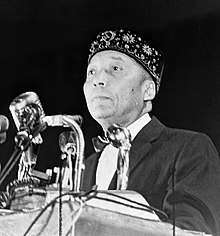
Back إلايجا محمد Arabic Eliyah Məhəmməd Azerbaijani Elijah Muhammad Danish Elijah Muhammad German Elijah Muhammad Spanish Elijah Muhammad Estonian الیجا محمد Persian Elijah Muhammad Finnish Elijah Muhammad French Elijah Muhammad Irish
Elijah Muhammad | |
|---|---|
 Elijah Muhammad speaking in 1964 | |
| Leader of the Nation of Islam | |
| In office 1933–1975 | |
| Preceded by | Wallace Fard Muhammad[1] |
| Succeeded by | Warith Deen Mohammed |
| Personal details | |
| Born | Elijah Robert Poole October 7, 1897 Sandersville, Georgia, U.S. |
| Died | February 25, 1975 (aged 77) Chicago, Illinois, U.S. |
| Spouse | |
| Children | at least 23 (8 with Evans, 15 with others), including Jabir, Warith, and Akbar |
| Occupation | Leader of the Nation of Islam |
Elijah Muhammad (born Elijah Robert Poole; October 7, 1897 – February 25, 1975) was an American religious leader, black separatist, and self-proclaimed Messenger of Allah who led the Nation of Islam (NOI) from 1933 until his death in 1975.[1][2][3] Muhammad was also the teacher and mentor of Malcolm X, Louis Farrakhan, Muhammad Ali, and his son, Warith Deen Mohammed.
In the 1930s, Muhammad formally established the Nation of Islam, a religious movement that originated under the leadership and teachings of Wallace Fard Muhammad and that promoted black power, pride, economic empowerment, and racial separation. Elijah Muhammad taught that Master Fard Muhammad is the 'Son of Man' of the Bible, and after Fard's disappearance in 1934, Muhammad assumed control over Fard's former ministry, formally changing its name to the "Nation of Islam".
Under Muhammad's leadership the group grew from a small, local black congregation into an influential nationwide movement. He was unique in his embrace of both black nationalism and pan-Africanism, with traditional Islamic themes. He promoted black self-sufficiency and self-reliance over integration, and he encouraged African Americans to return to their African homeland. Muhammad also rejected the civil rights movement for its emphasis on integration, instead promoting a separate black community.
His views on race and his call for blacks having an independent nation for themselves, made him a controversial figure, both within and outside the Nation of Islam. He has been variously described as a black nationalist, a black supremacist, and a religious leader who fought for the rights of African Americans.
Muhammad died on February 25, 1975, after a period of declining health. He was succeeded as head of the NOI by his son, Wallace Muhammad, who renamed the organization as the World Community of al-Islam in the West. Wallace Muhammad later changed his name as part of his own transition to Sunni Islam and is now known as Imam Warith Deen Mohammed.
- ^ a b Corbman, Marjorie (June 2020). Fletcher, Jeannine H. (ed.). "The Creation of the Devil and the End of the White Man's Rule: The Theological Influence of the Nation of Islam on Early Black Theology". Religions. 11 (6: Racism and Religious Diversity in the United States). Basel: MDPI: 305. doi:10.3390/rel11060305. eISSN 2077-1444.
- ^ Curtis IV, Edward E. (August 2016). Wessinger, Catherine (ed.). "Science and Technology in Elijah Muhammad's Nation of Islam: Astrophysical Disaster, Genetic Engineering, UFOs, White Apocalypse, and Black Resurrection". Nova Religio: The Journal of Alternative and Emergent Religions. 20 (1). Berkeley: University of California Press: 5–31. doi:10.1525/novo.2016.20.1.5. hdl:1805/14819. ISSN 1541-8480. S2CID 151927666.
- ^ Berg, Herbert (2011). "Elijah Muhammad's Redeployment of Muḥammad: Racialist and Prophetic Interpretations of the Qurʾān". In Boekhoff-van der Voort, Nicolet; Versteegh, Kees; Wagemakers, Joas (eds.). The Transmission and Dynamics of the Textual Sources of Islam: Essays in Honour of Harald Motzki. Islamic History and Civilization. Vol. 89. Leiden: Brill Publishers. pp. 329–353. doi:10.1163/9789004206786_017. ISBN 978-90-04-20678-6. ISSN 0929-2403.
© MMXXIII Rich X Search. We shall prevail. All rights reserved. Rich X Search